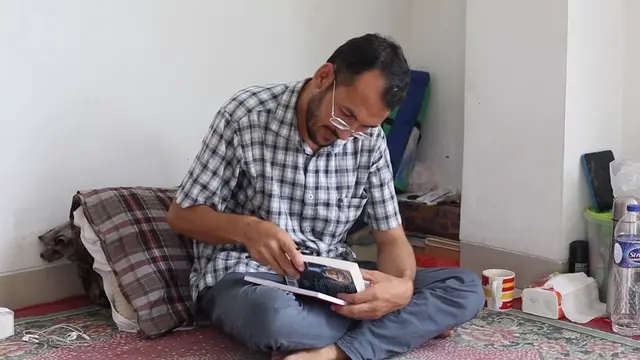Hasan Ramadai has been a refugee in Indonesia for more than three years. In early 2016, he left his hometown of Afghanistan in search of a better life for his family, especially his children.
Three years later, Hasan is still looking for some sense of hope. He is currently seeking temporary shelter at the Kalideres camp in West Jakarta. His pleas for support towards UNHCR and other refugee organizations have largely been ignored, leaving him to stay in this camp indefinitely.
"I applied to teach as a volunteer and also to get some support from them but I was in the waiting list for two years and then finally I was rejected. I also asked UNHCR for some opportunities but I haven't received any support from them," says Hasan.
For now, he continues to live in uncertainty along with thousands of refugees that reside in this camp.
He volunteers to teach at the Kalideres camp in West Jakarta. /CGTN Photo
The uncertainty has forced Hasan's family to leave Indonesia. Today, he is separated from his wife and children who are now in Pakistan, while Hasan continues to search for a stable future for them.
The camp Hasan is currently residing in is a temporary camp put up by the Social Affairs Ministry. It houses both local residents that are homeless as well as asylum seekers. He still relies on the government for basic necessities such as water, food and medical aid.
"We are not sure if we can remain here in Indonesia. This is a transit country for us, but if there's any solution, if the government of Indonesia signs something or counts us as their own in this nation, then we will welcome them," says Hasan.
However, the camp is currently struggling with the amount of refugees and local residents that are expecting to live under its roof. With spaces being limited, living conditions are not ideal.
Najeeb has been waiting to reach his final destination country, Australia. /CGTN Photo
"The reason why we don't take many refugees is because we have certain barriers. Sometimes it's language, medical or even food. And for the refugees, it's very different from the local occupants that reside here. This sometimes causes a gap between foreigners and locals who live in the safe house," says Ariyana, a social worker at the camp.
Najeeb has also been awaiting settlement. He has been waiting to reach his ideal destination of Australia for years.
"I wanna go to Australia because it's a good place for vulnerable people like me, who is not so educated, I can find a job for myself there and find a safe place to live peacefully. All we want is peace. As immigrants, ultimately we don't care where we end up, we just want to live a peaceful life," says Najeeb.
Many of the refugees that are in Indonesia are hoping to be resettled elsewhere, often in Canada or Australia, but strict immigration policies, underfunding and a lack of resources in those countries have left them stuck here in limbo with no financial support or any legal rights to work.
Refugees in Indonesia still face hostility from local residents and the government. /CGTN Photo
Indonesia has not ratified the Refugee Convention but contributes 60,000 U.S. dollars to the UN agency every year.
Although it hasn't signed any formal agreements, the country is currentlyhome tomore than 15,000 refugees who have been stuck here for years to be resettled.
For now, it may seem all hope is lost for Hasan and Najeeb, but the growing community of refugees in the camp provides positivity to those who are still in transit.
(CGTN)
 简体中文
简体中文












